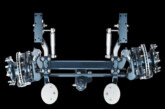A guide to heavy-duty engine oils

After an influx of cases in its 10th anniversary year, the new chair of the lubricants industry trade body, the Verification of Lubricant Specification (VLS), Harald Oosting, reports on recent cases relating to HGV and LCV engines and guidance for obsolete heavy-duty engine oil claims.
As is widely known the Verification of Lubricant Specifications (VLS) exists to provide a credible and trusted means to verify lubricant specifications. Workshop technicians must have confidence that, in an increasingly complex market, the lubricant they select for a particular vehicle really can deliver what it claims.
In 2023, VLS received the highest number of cases since 2015 and passed two milestones, opening its 100th investigation in its 10th anniversary year. The rise in cases reflects the increasing complexity of the lubricants market and the work VLS has done to raise awareness of the importance of lubricant standards.
Under investigation
Several heavy-duty and light-duty commercial vehicle engine oils have recently been investigated, as well as passenger car engine oils, central hydraulic fluids, hydraulic oils, gear oils, transmission fluids and a universal tractor transmission oil.
The 100th investigation, Case VLS010201, concerned Aztec Oils Emprotec UHPD 10W40 Heavy Duty Diesel Oil (HDDO). A complaint was received regarding the product’s claims to meet OEM specification RLD-4, which is not known to be generally available in the automotive aftermarket. The named party, Aztec Oils, moved quickly to withdraw the claim against RLD-4, retaining the claim against RLD-3 and amending the product’s description and technical data sheet accordingly. VLS is content that the product has been brought back into compliance and the case has been closed subject to a six-month review.

Case VLS 010195 was opened in August 2023 after VLS received a complaint alleging that Silverhook 5W-30 Supreme Plus was making erroneous claims, such as Ford, BMW, Dexos, etc., with no supporting manufacturer specifications or numbers. The complainant also alleged that it was unlikely that all the bespoke additive packs for each of these specifications could be included in one oil.
VLS reviewed and upheld the complaint as the claims were not specific and required clarification. Some claims were also mutually exclusive due to the sulphated ash requirements and phosphorous limits of the categories being claimed.
While the named party did respond to the complaint, VLS considered that the response was insufficient, the complaint was not fully resolved, and the investigation was concluded.
Lack of evidence
In May 2024, VLS undertook a six-month review of the case. The technical review panel had concerns about the product meeting the fuel economy requirements of ACEA C2 and ILSAC GF-6 whilst meeting the tough durability requirements of VW 504.00/507.00. Evidence of support for PSA B71 2290 (ACEA C2/C3 based) had still not been provided.
Other inconsistencies in the performance claims were still present, as well as several inaccurate or ambiguous performance claims. Consequently, VLS believed that the product was still noncompliant and reported it to its primary authority partner, Buckinghamshire & Surrey Trading Standards and to SAILEurope under the EELQMS Lubricant Marketer Letter of Conformance for claims made against the ACEA engine oil sequences.
Many other cases have been brought to a successful conclusion. In case VLS010188, an investigation into a Multi UTTO (Universal Tractor Transmission Oil) WB 101, the Named Party, Mannol, retracted claims against John Deere J20D, CNH MAT 3525 & 3526, and Massey CMS 1141 claims and reflected this on the product website and technical data sheet. VLS was satisfied that the product is in compliance at the six month review in June 2024 and the case has been closed.

Out of date
VLS has also recently worked with the European organisation ATIEL to produce guidance on the use of retired claims in the HDDO market. Claims for non-continuing classes/categories, such as ACEA E6, remain valid if they are from the most recent ACEA issue when the category was valid, even though the category does not appear in the current issue of the ACEA heavy duty engine oil sequences.
For example, it is still possible to claim ACEA E6 or ACEA E9 (which have been superseded by new ACEA E8 and ACEA E11 categories) even after 1st May 2024 as it is a retired or obsolete category, but marketers must have a copy of the supporting data for the last available version of the sequences for audit. The lubricant marketer must also be able to meet the ACEA engine oil sequence claimed in full, even if it is obsolete. Claims must also be supported by the technology provider or additive company.
The lubricants sector is transforming in response to OEM design changes and the need to meet increasing emissions legislation. The strive towards electrification, alternate fuels, Euro 7 proposals, trends towards lower viscosity products, increasing use of biofuels and the need for lubricant compatibility with emission control devices are all having an impact. It’s more important than ever that we have a robust, anonymous process that holds producers to account for product performance claims and protects end users.
VLS is confident that the message around compliance is being heard. Lubricant blenders, manufacturers, and distributors alike know that they will be held accountable for ensuring that lubricants are correctly described and can deliver what they claim. But as the industry evolves, we know there is still work to be done to ensure an open and fair marketplace in which end users can have confidence.









